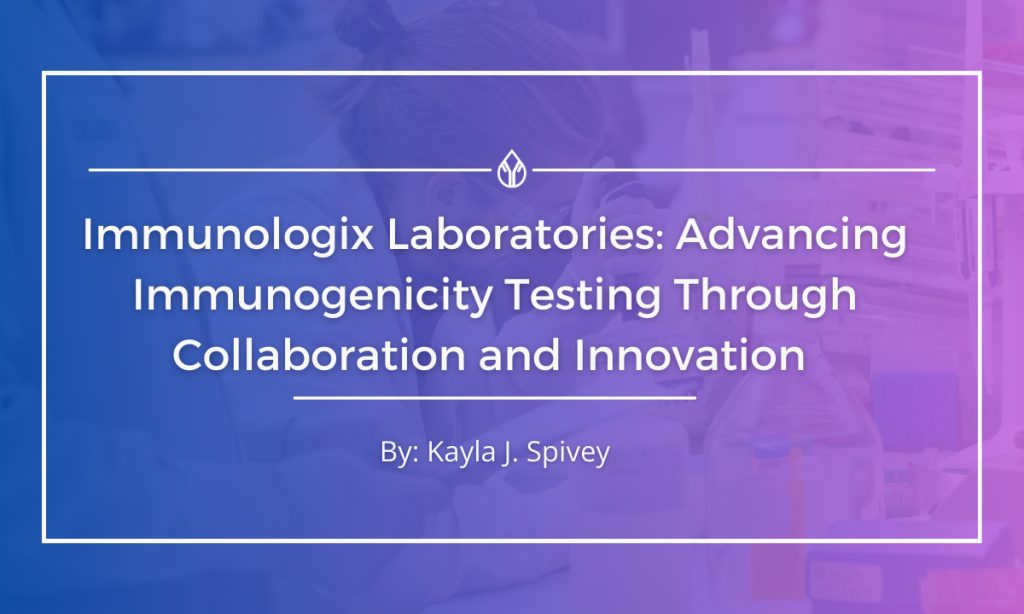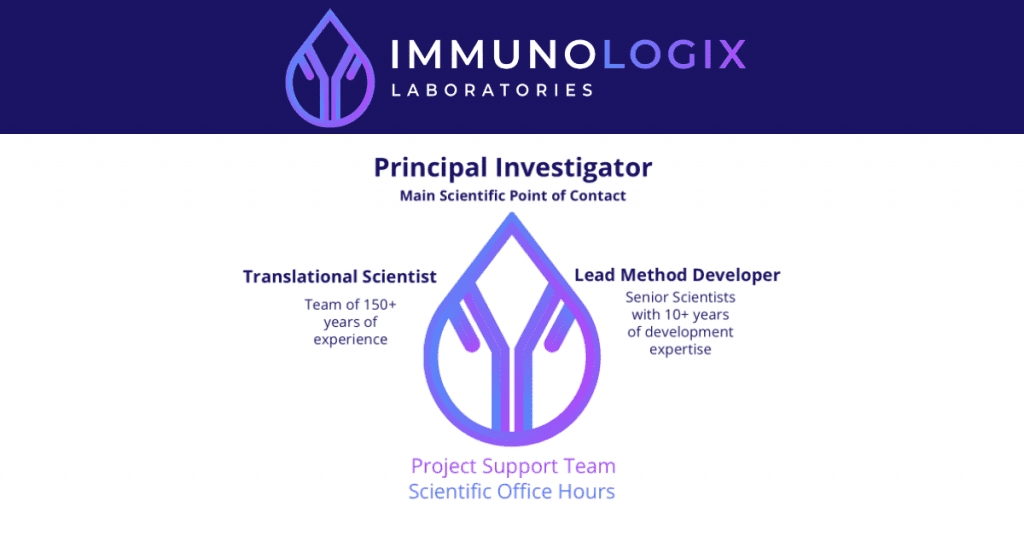Immunologix Laboratories: Advancing Immunogenicity Testing Through Collaboration and Innovation

At Immunologix Laboratories, we’re committed to continually innovating in the field of bioanalytical science, particularly in the critical field of immunogenicity testing. This field has been instrumental in identifying unwanted immune responses to proteins administered in clinical studies for over two decades. As our collective understanding grows, we believe our approaches must evolve accordingly.
We’re proud to contribute to the ongoing dialogue in this field, through our participation in the European Bioanalysis Forum (EBF) Autumn Focus Workshop in 2023. This event, which featured insights from industry leaders, including our own Chief Scientific Officer, Dr. Lauren Stevenson, provided valuable context for recent discussions in immunogenicity testing strategies (Stevenson, 2023). The recent EBF paper on establishing appropriate drug tolerance levels in antidrug antibody assays has further enriched this dialogue (Cowan et al., 2024).
Embracing First Principles Thinking
Our team at Immunologix Laboratories begins every drug development project with an intensive intake process that deeply examines your program’s current needs and future objectives. This comprehensive evaluation ensures our laboratory services and assay development strategies align with both immediate requirements and long-term goals. Building on this foundation, we emphasize the importance of “First Principles Thinking” instead of “Reasoning by Analogy.”
This approach, highlighted by Dr. Stevenson involves actively questioning our assumptions and creating new solutions from the ground up (Stevenson, 2023). Rather than defaulting to standard templates, our team analyzes key program drivers identified during intake to develop tailored, innovative solutions through our laboratory services. Encouraging our scientists to be constantly aware of the limits of their understanding and to challenge existing paradigms is fundamental to our scientific process, allowing us to deliver optimized assays that evolve with your program’s needs.
Recognizing Immunogenicity as a Biomarker
A critical concept that aligns with our philosophy is the recognition of immunogenicity as a biomarker (Stevenson, 2023). This perspective, enriched by our extensive biomarker laboratory experience across multiple therapeutic areas, invites new possibilities in how we approach immunogenicity testing. Our integrated scientific teams share expertise seamlessly between immunogenicity and biomarker disciplines, ensuring best practices flow in both directions.
By defining immunogenicity as a measurable indicator of biological responses to therapeutic interventions, we apply the rigorous methodologies of biomarker science to this critical aspect of drug development. This cross-pollination of expertise allows our scientists to develop truly fit-for-purpose assays that benefit from our comprehensive understanding of both fields, resulting in more robust and meaningful analytical solutions for your drug development program.
Emphasizing Context of Use (CoU) in Our Work
Dr. Stevenson’s presentation and the recent EBF paper stress the importance of understanding the context of use (CoU) for each immunogenicity assay (Stevenson, 2023; Cowan et al., 2024). At Immunologix, we’ve successfully implemented these principles across both our biomarker and immunogenicity laboratories, demonstrating their practical value through hundreds of successful assay validations.
Our extensive biomarker experience has sharpened our ability to consider critical factors such as:
- The stage of development (preclinical, clinical, phase I vs. phase III)
- The scientific value of the results
- The immunogenicity risk level of the molecule
This proven approach, refined through our biomarker laboratory’s extensive experience with fit-for-purpose validation strategies, allows us to tailor our immunogenicity assessments to the specific needs of each project. By applying these well-established biomarker principles to immunogenicity testing, we consistently provide our clients with the most relevant and valuable data for their drug development programs.
Challenging the Status Quo
Our team is committed to continual improvement and scientific rigor. Recent industry discussions, including those reflected in Dr. Stevenson’s presentation and the EBF paper, have challenged aspects of current immunogenicity testing approaches. These include rethinking the universal application of the three-tiered approach and carefully considering the appropriate drug tolerance levels in antidrug antibody assays (Stevenson, 2023; Cowan et al., 2024).
We’ve successfully applied this thinking to streamline preclinical immunogenicity assessments by focusing on signal-to-noise ratios as a direct measure of ADA magnitude, rather than automatically defaulting to the traditional screen-confirm-titer approach. For example, in preclinical studies where the primary goal is understanding relative immunogenicity between candidates, our simplified approach delivers clinically relevant data more rapidly and at significant cost savings compared to the standard three-tiered method.
This practical, rationalized strategy maintains scientific integrity while eliminating unnecessary testing steps that add little value to program decisions. Through real-world implementation, we’ve demonstrated that this approach not only accelerates development timelines but also provides the specific data needed for candidate selection and development decisions. These perspectives have informed our broader approach, which strives to provide tailored solutions based on thorough risk assessments that balance scientific needs with program efficiency and regulatory requirements.
Immunologix Vision for a 21st Century Paradigm
Inspired by recent insights from the EBF and industry leaders at Immunologix, we’re working towards a new paradigm in immunogenicity testing that can address traditional modalities, new modalities, and yet-to-be-imagined modalities. Our approach, aligned with Dr. Stevenson’s proposed 21st Century Paradigm (2023), includes:
- Robustly evaluating risk, rather than assuming everything is high-risk
- Focusing on clinical impact and value-added
- Having the flexibility to address new questions, such as when immunogenicity is beneficial for therapeutic efficacy
- Accommodating ever-expanding contexts of use
Our Commitment to a Patient-Centric Approach
The concept of “ROI for patients,” as discussed by Dr. Stevenson (2023), resonates deeply with our company’s mission. We believe that everything we do should be justifiable to a patient. This patient-centric approach guides our work, ensuring that we’re not just doing more but doing what’s most beneficial for patient outcomes.
The Path Forward
At Immunologix Laboratories, we’re proud to be part of the vital dialogue shaping the future of immunogenicity testing. Dr. Stevenson’s insights at the EBF workshop and the recent EBF paper underscore our commitment to advancing the field through critical thinking and adaptability.
We believe that we can develop more effective and efficient testing strategies by recognizing immunogenicity assays as biomarker assays and focusing on their specific contexts of use. This approach allows us to serve our clients better and, ultimately, the patients who benefit from the therapies we help develop.
As we move forward, Immunologix Laboratories will continue to embody the call to “Be a Scientist” – constantly questioning, rethinking, and adapting our approaches based on new data and understanding (Stevenson, 2023). We’re excited to be part of shaping a more flexible, context-driven approach to immunogenicity testing that can adapt to the evolving landscape of biotherapeutics.
Connect with Us

If you’re navigating the complexities of immunogenicity testing in your drug development program, we’re here to help. At Immunologix Laboratories, our unique triad model brings together a dedicated Principal Investigator, Lead Method Developer, and Translational Sciences expert who work in concert to optimize your program. This integrated approach combines strategic consulting with advanced laboratory services, ensuring your immunogenicity testing strategy is both scientifically robust and contextually appropriate for your specific therapeutic needs. For more information on how our collaborative model can support your drug development journey, please contact us through our website.
Let’s work together to advance your therapies with data-driven, patient-focused approaches.
References
Cowan, K. J., Champion, L., Dyer, D., Carlsen, M. F., Geary, L., Genin, J. C., Golob, M., Goodman, J., Kromminga, A., Nelson, R., Revell, H., Rieger, M., Van de Vyver, O., Venema, F., & Timmerman, P. (2024). The European Bioanalysis Forum recommends establishing appropriate drug tolerance levels in antidrug antibody assays. Bioanalysis, 1–7. https://doi.org/10.1080/17576180.2024.2376950
Stevenson, L. (2023). A 21st Century Paradigm: Immunogenicity Assays Are Biomarker Assays. Presentation at EBF Autumn Focus Workshop: Challenging the Current Paradigm for ADA Testing, Malaga, Spain.
Expert Bio

Dr. Lauren Stevenson
Chief Scientific Officer & Head, Translational Sciences
As co-founder and head of the Translational Sciences Division, Dr. Lauren Stevenson is leveraging her experience from both small and large biotech/pharma sectors to build a world-class team of scientists who will partner directly with clients to provide translational strategies, facilitate regulatory engagements, and deliver the assays, datasets, and integrated analyses to advance drug development programs.
Lauren is a recognized industry-wide thought leader in biomarker development, large molecule bioanalysis, and immunogenicity. She brings 20+ years of drug development experience, building and leading scientific teams with expertise in setting bioanalytical and biomarker strategies and developing PK, immunogenicity, and biomarker assays in support of therapeutic programs that span multiple modalities and disease indications through all stages of development, from discovery to post-market. Using integrated scientific approaches, Lauren’s teams have a strong track record of reliably delivering high-caliber science and increased efficiencies that enable them to ‘do more with less’ and influence industry best practices and regulatory guidance.
Externally, Lauren has authored multiple white papers and engages the broader industry and regulatory agencies as an invited speaker and course instructor at multiple conferences and workshops each year. In concert with her scientific role, Lauren is passionate about people development, has received certification as a Strengths coach, and is active in mentorship and career development programs.
